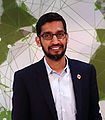
Google boss calls for rules for face recognition
22. Januar 2020Google boss calls for rules for face recognition
Brussels, 22.2.2020
According to Google boss Sundar Pichai, facial recognition would be the first AI technology to be regulated with priority. He did not forget to add that Google has for years refrained from offering facial recognition capability as a service „because we realized that it is a technology full of risks.
Pichai recommended that this technology should be put on hold „before we think about how to use it“. The Google boss called on governments to quickly establish rules for the use of facial recognition.
The new CEO of Google’s parent company, expressed his views in a keynote address in Brussels on Monday. He told listeners that „there is no question“ that AI technology such as facial recognition needs regulation, but the approach is the most important and „international alignment“ between all the rules adopted by the EU and the US is needed. „History is full of examples of how the virtues of technology are not guaranteed,“ Pichai said.
Earlier, some reporters had already leaked a proposal by the European Commission to ban face recognition in public areas for three to five years. The paper also draws attention to the already adopted General Data Protection Regulation (GDPR), which it says could become the basis for regulating AI. „We need a GDPR for AI as well,“ @ELTIassociation wrote on Twitter.
Google’s cloud rival Amazon is marketing a facial recognition technology called „recognition“ that customers and investigative agencies can learn from their image databases. In addition, several Asian high-tech companies offer facial recognition products.
Just last weekend, a report in the New York Times revealed that a US company called Clearview AI had compiled a database of around three billion images freely accessible on the Internet and was offering a facial recognition service on this basis. Last year more than 600 authorities were offered access to it, the newspaper wrote over the weekend, citing the company as a reason. Clearview does not provide any information on which authorities these were. On its website, the company has Canadian investigators, whose specialty is the investigation of sexual crimes, praised.
According to the company, publicly accessible images on platforms such as Facebook and YouTube or the US payment service Venmo were sucked into the database. A collection in this dimension would surpass previously known facial recognition databases. In the USA, the authorities use facial recognition to verify the identity of those entering the country – but they use images that were taken specifically for this purpose.
Clearview was founded by 31-year-old Hoan Ton-That, who came to the United States from Australia. His previous business ideas have had little success. This includes an app that allowed users to capture Trump’s signature hairstyle in their photos. In the meantime, he had thought about a career as a model, but then decided to get into the business of face recognition, he told the „New York Times“.
Ton-That also admitted in response to the newspaper’s inquiry that Clearview had also developed the prototype of computer glasses with face recognition capabilities – but there were no plans to market them.
The report already triggered initial political reactions at the weekend. U.S. Senator Ron Wyden, a member of the Democratic Party, expressed concern and demanded that Americans should know whether their photos are secretly being stored in a private database.
A former financier was US billionaire Peter Thiel. The PayPal co-founder and Facebook investor is known for his libertarian views and as one of the few declared supporters of President Donald Trump in Silicon Valley. His spokesman told the newspaper that Thiel had supported Clearview with $200,000 in 2017 and received a share in return. He was not otherwise involved.


